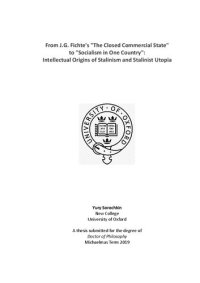
Ebook: From J.G. Fichte's "The Closed Commercial State" to "Socialism in One Country": Intellectual Origins of Stalinism and Stalinist Utopia
Author: Yury Sorochkin
- Year: 2019
- Publisher: University of Oxford
- City: Oxford
- Language: English
- pdf
This thesis examines the intellectual origins of the ideological system underlying the political practices of the Stalinist state. The Stalinist state is understood here as the regime which had superseded the earlier, transitional, Bolshevist state born as a result of the 1917 October revolution. The latter lasted for slightly over ten years. Its successor emerged in the course of a second transitional period which started sometime around late 1927 - early 1928 and came to a close four years later. Each of these two phases of the Soviet project had its own set of distinctive features, and the differences between the two can be observed in all areas of life. While the transition from the Bolshevist to the Stalinist state is well researched, it is, at the same time, insufficiently conceptualized, except in the field of cultural studies, within which this work was done, first and foremost, by Vladimir Paperny and Boris Groys. However, the change was all-embracing and was not limited to matters of culture. It was also sweeping: the revolutionary Marxist ideology, the very ideological foundation of the Bolshevist state, was replaced by something far different. The cornerstone of Stalinist state ideology was the concept of "socialism in one country", which is known to have been first proposed by the German social democrat Georg von Vollmar in 1870. This thesis argues that this core Stalinist idea goes back to more remote times and originates in the political economy of Johann Gottlieb Fichte, as found in his 1800 treatise "The Closed Commercial State". The thesis traces the route Fichte's ideas travelled through the 19th century: first, from Fichte to Ferdinand Lassalle, then along the perplexed trajectory of the German Social‐Democratic Party's ideological evolution, to the Second International and finally, to post-revolutionary Russia. It was established in the course of research that, contrary to what was previously thought, Stalin was familiar with the abridged Russian translation of Georg von Vollmar's 1880 pamphlet on the "Isolated Socialist State": the copy of this text with numerous marks was found in Stalin's archive. The copy dates from December 1926, when the concept of "Socialism in one country" was already being widely discussed. However, close reading of Vollmar's treatise and Lenin's 1915 article "On the Slogan for a United States of Europe" suggests that while Stalin was drawing upon the sole relevant paragraph from Lenin's article, this paragraph in turn, originates directly from Vollmar. Moreover, close scrutiny of Stalin's marks points to the serious possibility that Vollmar's ideas had a long-term impact on the principles of the Soviet pre-war foreign policy and the relationship between the USSR and the Comintern.
Download the book From J.G. Fichte's "The Closed Commercial State" to "Socialism in One Country": Intellectual Origins of Stalinism and Stalinist Utopia for free or read online
Continue reading on any device:

Last viewed books
Related books
{related-news}
Comments (0)